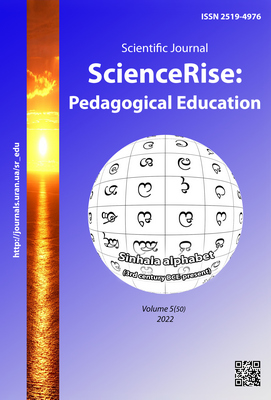Features of formation of the cognitive activity of children of middle school age using simple experiments
DOI:
https://doi.org/10.15587/2519-4984.2022.263615Keywords:
cognitive activity, children of middle preschool age, experimentsAbstract
The article reveals the content of the concept of cognitive activity of children of middle preschool age, which was considered through the prism of the child's personal development and its influence on the child's intellectual sphere, therefore, cognitive activity develops through cognitive operation. The peculiarities of the use of simple experiments in the preschool education institution, which create prerequisites for the formation of cognitive activity, intuition towards nature and understanding of its meaning and acquisition of nature research skills, are analyzed. Identified components of cognitive activity: motivational, cognitive, activity, evaluative. The following practices (interviews with educators, questionnaires) and research methods were determined for pedagogical diagnosis of the levels of formation of the cognitive activity of children of middle preschool age: diagnostic method of cognitive development "What objects are hidden in the pictures?" (R. Nemov), the method of diagnosing the psychosocial maturity of children's behavior (O. Taran), the method of D. Godovikova, the method of examining the cognitive development of children by E. Strebeleva. The presented results of an experimental study of the peculiarities of formation of the cognitive activity of children of middle preschool age showed mainly an average and low level of development. The presented method of forming the cognitive activity of children of middle preschool age by means of simple experiments provided for a number of specially selected simple experiments that were included in classes from different sections of the program. The selected experiments were aimed at forming the cognitive activity of children of the middle group, and were diverse in terms of subject matter and duration. The results of observation of children after the implementation of the method showed increased interest in cognitive activities, motivation to independent search for the causes and consequences of various natural phenomena, etc
References
- Pirozhenko, T., Ladyvir, S., Vovchyk-Blakitna, O., Blakytna, I., Karabaieva, K., Karasova, O. et. al.; Pirozhenko, T. O. (Ed.) (2012). Stanovlennia vnutrishnoi kartyny svitu doshkilnyka. Kirovohrad: Imeks-LTD, 236.
- Bazovyi komponent doshkilnoi osvity (2021). Nakaz MON No. 33. 12.01.2021. Available at: https://mon.gov.ua/storage/app/media/rizne/2021/12.01/Pro_novu_redaktsiyu%20Bazovoho%20komponenta%20doshkilnoyi%20osvity.pdf
- Tovkach, I. Ye. (2017). Indyvidualni osoblyvosti piznavalnoi aktyvnosti starshykh doshkilnykiv. Kyiv: In-t psykh. imeni H.S, Kostiuka, 23.
- Dovbnia, S. O., Shulihina, R. A. (2019). Theoretical and methodological leading of preschool children play activity. Pedagogical Sciences Reality and Perspectives, 1(72), 171–176. doi: https://doi.org/10.31392/npu-nc.series5.2020.72-1.38
- Zahorodnia, L. (2021). Dytyna v pryrodnomu dovkilli. Doshkilne vykhovannia, 6, 3–6.
- Seliuk, I., Holosiienko, K. (2021). U kozhnii hrani vidkryttia y kliuch do tsikavoho zhyttia! Doshkilne vykhovannia, 1, 35.
- Sliusar, A., Hrynko, V. (2021). Sekrety Pryrodnychoi laboratorii. Doshkilne vykhovannia, 6, 12-14.
- Lystopad, O. A. (2021). Teoretyko-metodychni zasady formuvannia hotovnosti maibutnikh vykhovateliv do vykorystannia informatsiino-komunikatsiinykh tekhnolohii v orhanizatsii piznavalnoi diialnosti doshkilnykiv. Odesa: Bukaiev Vadym Viktorovych, 305.
- Sadova, T. A., Rudakova, A. O. (2017). Formuvannia piznavalnoi aktyvnosti doshkilnykiv yak psykholoho-pedahohichna problema. Molodyi vchenyi, 10, 49–52.
- Luchuk, V. (1999). Aktyvizatsiia piznavalnoi diialnosti. Rozkazhit onuku, 17-18, 26–29.
- Ladyvir, S. (2002). Piznavalnyi rozvytok: poshuk efektyvnykh shliakhiv. Doshkilne vykhovannia, 10, 4–6.
Downloads
Published
How to Cite
Issue
Section
License
Copyright (c) 2022 Oksana Stupak, Maria Dyachuk

This work is licensed under a Creative Commons Attribution 4.0 International License.
Our journal abides by the Creative Commons CC BY copyright rights and permissions for open access journals.
Authors, who are published in this journal, agree to the following conditions:
1. The authors reserve the right to authorship of the work and pass the first publication right of this work to the journal under the terms of a Creative Commons CC BY, which allows others to freely distribute the published research with the obligatory reference to the authors of the original work and the first publication of the work in this journal.
2. The authors have the right to conclude separate supplement agreements that relate to non-exclusive work distribution in the form in which it has been published by the journal (for example, to upload the work to the online storage of the journal or publish it as part of a monograph), provided that the reference to the first publication of the work in this journal is included.








